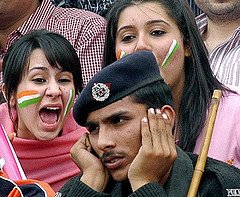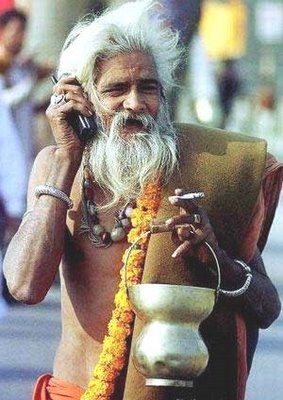 It’s a bit risky to grant Vinod Mehta the title 'Editor Extraordinaire'- not because he does not deserve it, but because 'Editor' also happens to be the name of his dog. (In Vinod Mehta's words-.... I acquired a puppy dog 12 months ago and when my wife asked me some weeks later what we should call him, I said "Editor". She said why? I said "Because he is stubborn, obstinate and thinks he knows everything"). So one is naturally cautious. But considering that Mr. Mehta has been called worse names by his many detractors, I am sure that he won't mind in the least. In fact chances are that he would be delighted at the latest addition to his notoriety.
It’s a bit risky to grant Vinod Mehta the title 'Editor Extraordinaire'- not because he does not deserve it, but because 'Editor' also happens to be the name of his dog. (In Vinod Mehta's words-.... I acquired a puppy dog 12 months ago and when my wife asked me some weeks later what we should call him, I said "Editor". She said why? I said "Because he is stubborn, obstinate and thinks he knows everything"). So one is naturally cautious. But considering that Mr. Mehta has been called worse names by his many detractors, I am sure that he won't mind in the least. In fact chances are that he would be delighted at the latest addition to his notoriety.
Vinod Mehta is a true maverick. He began his career as an editor to Debonair (and also established a record of sorts by becoming the country's youngest editor)- that priceless gem in Indian publishing, that has long since dis-continued its tradition of "uplifting" the great Indian male. It strikes me that it must have served as a solid grounding for Mr.Mehta, since I can't imagine a worse nightmare for an editor, than to induce his readers to flip through any pages other than the semi nudes on the centerfolds. I have a particularly soft spot for 'Debonair' since it awakened me, personally, to aspects of life which were hitherto unknown to my innocent teenage mind. But I daresay, editors like Khushwant Singh,Anil Dharker and Vinod Mehta did a wonderful job, since even my super charged hormone ridden one track brain wanted to go through the entire copy and not just the centerfold. Or may be I was just lucky since the copies of Debonair in my house, were particularly old editions, having been forgotten by a Right Honorable Judge, who used to rent our house, before we moved in. After the departure of these worthies (the Debonair editors, not the Judge), Debonair rapidly descended to become another rag with titillating pictures (not that we minded that, but the pictures were just not the same any more). I mean they were still nudes, but some how, I don’t know how to put it, they were the same as any other dirty magazine. Was it Khushwant Singh or Anil Dharker who once wrote about how a married woman walked into his cabin wanting to pose for Debonair and the hubby not minding in the least BECAUSE it was Debonair and not any other magazine? Now you know the kind of reputation Debonair enjoyed those days? It was like the HBR of soft smut, lets say.
After Debonair, Mehta became the founder-editor of India's first Sunday paper, The Sunday Observer, the founder editor of the now defunct Bombay daily, The Independent and the founder-editor of The Pioneer (Delhi edition). He was also editor of The Indian Post. He was either fired or left on his own, from each of these assignments, after acrimony with the owner of the publication over editorial control. He had acquired the reputation of a 'difficult' editor with owners, when the Raheja's recruited him to start Outlook. It was an instant hit. That it would succeed was never in question since Mr.Mehta's editorial credentials are impeccable. He has never been at the helm of anything that has failed in publishing. Under him, Outlook destroyed India Today, that Grand Daddy of magazines in India, so much so, that India Today tried unsuccessfully to be Outlook like. But it was always going to a failed enterprise. Simply because a magazine is always like its editor and Outlook has always been cast in Mr.Mehta's irrepressible impish mischievous, but at the same time, journalistically solid mould. That was not something which could be copied so easily. In his own words Outlook has aspired for "...a purposeful mix of irreverent and purposeful journalism... I have been an editor now for thirty years and my mission has been to make serious journalism popular – without trivialization, but with the occasional sex cover".
Outlook of course has gone on to shake the establishment (on all sides of the political spectrum) many many times, especially the right wingers, with Outlook's scarcely disguised attacks on them. Sometimes, I think Mehta takes perverse pleasure in riling them, and I love that about him. His own views about Journalists and Journalism and Outlook itself are also quite honest and what some editors would discuss only in their internal meetings, Mehta openly talks about in functions. Like "...But what I really treasure is the fact that we have created an "open" magazine. I believe that dissent is the life-blood of good journalism and you must admit that for a card-carrying pseudo-secularist, I invite and print those vehemently opposed to us.
We are the argumentative magazine. I don't particularly enjoy self-flagellation, but I know Outlook would become deadly dull if those who disagree with us do not get a look in.
Ladies and gentlemen, the myth about journalists being unbiased needs to be shattered. In my thirty years in the profession I have yet to meet an unbiased journalist, someone who is an ideological eunuch. Outlook makes no effort to hide its liberal-centre-left stance. But we are part of a matrix.....
Biased or unbiased, I believe the political class in India takes the media far too seriously. Listen, we are just a bunch of guys and gals sitting around a table pretending to decide your fate.
And remember, we have deadlines to meet and we have to be first with the news. We make mistakes. Mistakes of judgment, mistakes of fact, mistakes of prejudice, mistakes under competitive pressure. Hype is part of our business. It is not part of yours.
For us every disagreement is irreconcilable, every verbal spat is an all-time low, every small turbulence in government means the government is falling, every change in foreign policy is a sell-out."
The plurality of the Indian media – and that is our free press's greatest strength – ensures that biases get cancelled. And finally the reader gets an approximation of the truth."
But whatever be the merits of Outlook, I buy it primarily for Mehta's own column on the back page, which he writes once in a while. His writing is a delight. He is easily one of India's best columnists. Mehta, in fact, is probably one of the few writers in India who do not believe in throwing difficult words and jargon while writing their pieces. The other illustrious writers in this category are Khushwant Singh and R.K.Narayan. You can sample some of Mehta columns here and here.
A few weeks ago Outlook completed 11 years of existence. It has gone on to spawn many sister publications which have also become wildly successful. It continues to delight, rile, titillate and draw love and affection of many. As the cliche' goes, you can love it or hate it but you cannot ignore it. So Mehta's advice to the readers about how to really hurt a journalist ("...I'll let you into a secret. If you really want to get even with a journalist or editor, tell him when he meets you that you did not read his last piece, or better still, never read his pieces. Nothing hurts a journalist more than the fact that his words of profound wisdom have not been read"), will at least in Outlook's case, surely fall on deaf ears.























